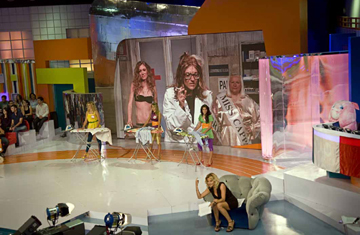
The popular TV show Quelli Che ... Il Calcio
Standing in their uniform miniskirts and stilettos, three young women bend over ironing boards, pressing men's shirts before a live studio audience. They're competing to be schedine, young women who dance a little, wear little and say little on Quelli Che ... Il Calcio (Football Fans), a popular Sunday afternoon show on Italian state TV. "Schedine have to be beautiful, but they've also got to be practical," grins the show's presenter. "Let's see how they do!" An ex-footballer descends to judge the ironing contest, awarding the prize to a lissom blonde.
There's nothing new about breasts, thighs and silliness on Italian TV. They have bedazzled viewers since the 1980s, when the television stations of Silvio Berlusconi, a mere media mogul before entering politics, revolutionized the airwaves by putting Italians on a diet of American soap operas, football and sex all over his Mediaset empire. But the formula was about more than TV ratings; it also boosted Berlusconi's political fortunes.
More than 20 years after he transformed Italian TV, Berlusconi is Prime Minister for the third time; he has already served longer in the office than anyone since 1946. Of late, to be sure, he's taken some lumps. Italy's Constitutional Court overturned a law granting Berlusconi immunity from prosecution while in office, clearing obstructions to trials in which he is accused of bribery and illicit accounting at Mediaset. But even were he to be turfed out tomorrow, Berlusconi would leave a lasting legacy. His TV shows have seen to that. "Berlusconi changed the culture of Italy before he changed the politics of it," says Alexander Stille, author of The Sack of Rome, a book on Berlusconi's power tactics. "He introduced a culture of luxury and sex, one entirely different from the traditions of austerity promoted by Catholicism and the communists. His control of commercial television meant that he is the only politician in the world who helped create and shape his own electorate before it elected him."
At the heart of Berlusconi's culture is the velina, or showgirl, who is served up to Italians every day, like pasta. Some veline merely stand mute while male presenters talk. Some give on-air lap dances to chat-show guests, as did one earlier this year to Inter Milan coach José Mourinho. Others play the funny little games producers devise, posing as table legs, or braving cold showers in tight dresses. Some simply strip: Mediaset's homepage recently featured a clip of a blonde clad in a black garbage bag, slowly lowering it to reveal her breasts. Degrading? Undoubtedly. But there's no denying the status of the showgirl in Berlusconi's Italy. "We used to get 10 or 15 applications a week," notes Gabriele Bertone, an agent at a Milan talent agency. "Now we get hundreds." A recent poll among young girls in Milan showed their top choice of profession was to be a velina. "Sure, everyone wants to be [one]," shrugs Anna Depoli, a Milanese secretary waiting to take her seat in Quelli Che ... Il Calcio's audience. "If you're a velina, then you have the chance to get to know football players, and if you marry them, you could end up with a lot of money."
The velina has become more than a mainstay of Italian television; she is the rock on which Berlusconi built his political career. In the 15 years since he began dominating Italian politics, Berlusconi has created a seamless weave of entertainment and power. The Taliban may use the virtue of their country's women as a rallying cry; Berlusconi has used Italian women's beauty. Americans should invest in Italy, he once told a Wall Street audience, because it had the comeliest secretaries.
Playing the Game
Increasingly, the velina is a political player as well as a sexual one. Though just 18, Noemi Letizia — whose relationship with Berlusconi spurred feverish speculation in the Italian press this summer — knows how the game works. "[I want to be] a showgirl," she told an Italian newspaper. "I am interested in politics, too ... I'd rather be a candidate for the Chamber of Parliament. Papi Silvio would take care of that." Last year, Berlusconi formalized the politics-showgirls link, appointing Mara Carfagna, 32, a former velina and topless model, as his Minister for Equal Opportunities. This summer his party nominated four young starlets as candidates for the European parliamentary elections. "The idea was to make the party younger," says Elisa Alloro, a 33-year-old television presenter who was initially proposed as a candidate, and is the author of We, Silvio's Girls. "It was the first time in Italy that people were interested in the European elections — just because we were veline! " Berlusconi's soon-to-be ex-wife, Veronica Lario, was less impressed, decrying the tactic as "entertainment for the emperor."
